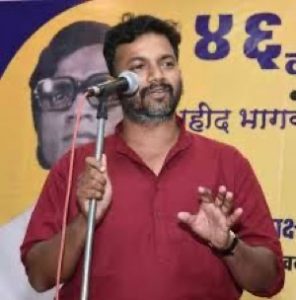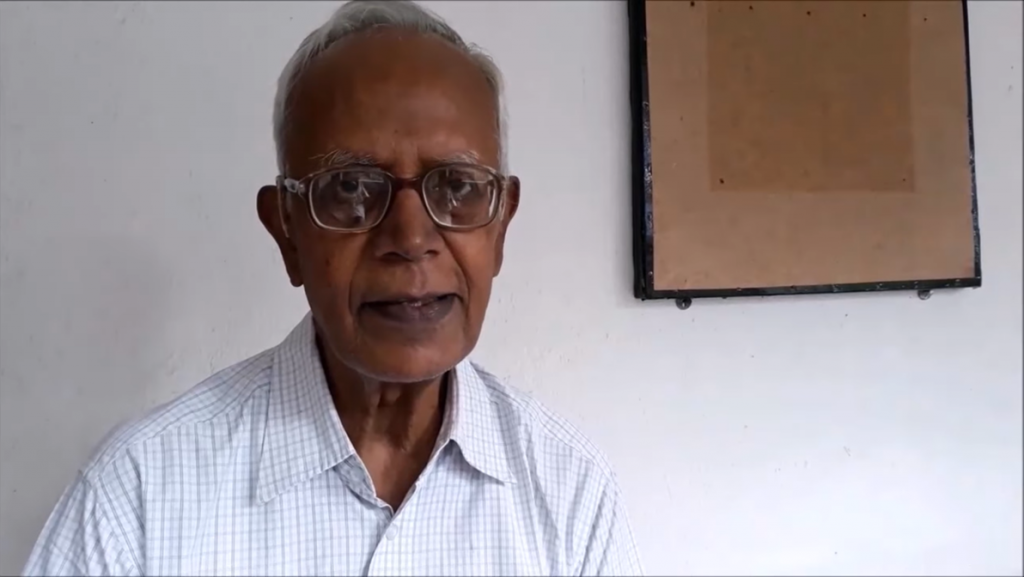Father Stan Swamy, an 84-year-old tribal rights activist, breathed his last on 5th July 2021. We at Foundation the London Story are deeply saddened by his unfortunate passing.
Father Stan Swamy (1937 – 2021)

Image Source: LiveLaw
Father Swamy was wrongly arrested by the Indian State on charges of terrorism and inciting violence in Bhima Koregaon.
“I have been there twice. I am not for being hospitalised in JJ Hospital. It will not improve, it will keep going. I would rather die here very shortly if things go on as it is,” Father Stan Swamy told the Bombay High Court on video-conference during his bail hearing.
Father Stan Swamy died in jail when he wanted to be with his friends in Ranchi, as he did not have any family since he was a priest. For more than 50 years, Father Stan Swamy worked in tribal areas in Jharkhand and helped marginalized communities. He found fulfilment in his faith by fighting for the rights of the tribal communities and not letting them get harassed by corporations and the abusive mechanisms of the State.
To his last breath, Father Swamy served the poor. Yet, in order to suppress his dissent, the State arrested him under the UAPA – the very law which Father Swamy dissented against time and again. Today, we not only feel pain but also rage. Rage because we, as a society, have failed to ensure justice for Father Swamy. He breathed his last cuffed to a hospital bed. He was 84 years of age with chronic illness. Our State, our judiciary and our politics have failed us.
With an extremely heavy heart, we bid adieu to Father Swamy, salute him for his service, and promise to fight for his comrades who are still behind bars under unfounded allegations.
RIP Father Stan Swamy. We mourn your loss!
Of the BK-16, all the other co-accused still remain behind bars, waiting for their trial to happen. Here we list the names of those incarcerated.
Sudha Bhardwaj (Lawyer, Civil Rights Activist)

Image Source: Wikipedia
Sudha is a human rights lawyer who renounced her American citizenship at the age of 18 to join the Indian civil liberties movement. Bhardwaj has lived in Chhattisgarh for more than 29 years of her life and has been helping tribals against the illegal acquisition of their land by the government and private companies. Her fight against the Adanis and the Birlas gained momentum after she became part of a lawyers’ collective – Janhit – for pro bono work. Her civil rights journey began as a trade unionist. She turned into a lawyer at 40 years old in order to fight for the rights of workers of industries such as Bhilai Wires, Kedia, Simplex etc. Bhardwaj has been an advocate of free and accessible legal aid to poor Adivasi people in order to help them retain their ancestral land. She carried forward Late Shankar Guha Niyogi’s labour rights movement Chhattisgarh Mukti Morcha and added a women’s limb to it, the Mahila Mukti Morcha. She continued to fight for labourers’ rights despite looming threats to her life. In addition to tribal and labour rights, Bhardwaj has been vocal against State-sponsored violence, particularly against women, and she has also fought for their reproductive rights and bodily autonomy. On multiple instances, Bhardwaj has approached the National Human Rights Commission (NHRC) for the cognisance of fake encounter cases, which are extremely widespread in Chhattisgarh. She is the general secretary of the Chhattisgarh Chapter of the People’s Union for Civil Liberties.
Arun Ferreira (Lawyer, Civil Rights Activist, Cartoonist)

Image Source: Frontline
A human rights lawyer from Mumbai, Arun Ferreira’s journey as an activist began in his college canteen in Mumbai. As a student at St. Xavier’s College, he motivated and organised his college’s canteen workers to demand for better work conditions. Since then he has been involved in helping the vulnerable, such as Mumbai’s slum dwellers, blind children and orphans. He has helped with the rehabilitation of slum dwellers at Dindoshi and relocation from Colaba to Goregaon. To encourage people to donate blood, Ferreira often organised blood donation camps and made sketches of persons who donated blood as a souvenir. He got involved in activism after getting inspired by his uncle Father Raymond D’Silva, who was a liberation theologist. He also became a part of the All-India Catholic University Students’ Association to be able to get a closer look at social injustice and work towards its elimination. He was arrested in 2007 for allegedly attempting to hold a secret meeting at Deekshabhoomi, a Buddhist pilgrim site, in Nagpur, Maharashtra. After proving his innocence and being released in 2011, he was re-arrested at Gadchiroli for allegedly conspiring in the Jafargarh police-naxalite encounter case. He was granted bail in 2012. While in solitary confinement in the Nagpur Jail, Ferreira sketched his experience in solitary confinement and published it as a book called Colours of the Cage (Aleph). An activist constantly involved in voicing concerns of the vulnerable, Ferreira continues to be in jail today for his alleged involvement in the Bhima Koregaon violence. His life has been a saga of false accusations and fabricated cases.
Varavara Rao (Poet, Activist)

Image Source: Redspark
Born in 1940, Varavara Rao is a poet and an activist. After graduating from college, Rao briefly worked for the Ministry of Information and Broadcasting as a publication assistant. He also worked as a lecturer in private colleges in Telangana. Rao’s activism began in 1967 after the Naxalbari uprising. Through his poetry, he wanted to encourage peasants to take a stand against the State. Dissatisfied with Abhyudaya Rachiyitala Sangham (Arasam), a literary platform of older poets, he formed Tirugubatu Kavulu (association of rebel poets) and Viplava Rachayitala Sangham (Revolutionary Writers’ Association), popularly known as Virasam, in order to support anti-establishment struggles. For him, his pen was the most powerful weapon against the State as he could write revolutionary poetry and inspire thousands to fight for their rights. Rao travelled across the state of Andhra Pradesh to understand the hardships of peasants and wrote poetry. He has 15 poetry works to his name and a literary magazine which survived for more than 20 years. He has also written multiple books as accounts of his struggle against injustice and days in prison. In 2005, Rao represented the People’s War Group to broker peace between the state government and the Maoist organisation. However, after a failure to mediate, he was arrested. For his work, Rao has been unlawfully arrested under oppressive security legislations multiple times. He has always come out innocent and carried forward on his mission against State oppression with new zeal every time. However, he is now counting his last breath in jail, due to his worsening health and the State’s inhumane harassment which violates all his rights.
Rona Wilson (Activist)

Image Source: Caravan Magazine
Born in Kerala, Rona Wilson is based in Delhi since his Master’s at Jawaharlal Nehru University (JNU), in which he focused on a survey on India’s economy between 1975 to 1995. He is a regular author for the Economic and Political Weekly and before his arrest, he intended to pursue a Doctorate abroad. His research particularly focused on the use of State machinery against Muslims and Kashmiris. His activism began at JNU when he was part of the Defence Committee for S.A.R Geelani, who was charged for the 2001 attack on the Indian Parliament. After his acquittal, Prof. Geelani founded the Committee for the Release of Political Prisoners (CRPP), to help those arrested under regressive security laws. Wilson was an integral part of CRPP and worked to uphold the objective of the UN Convention on Prisoners. Wilson has been involved in activism for political prisoners since the early 2000s.He was involved in the fight against the misuse of security laws and provided legal aid to political prisoners. He was also actively involved in the struggle for the release of Delhi University Prof. G.N. Saibaba, convicted for having links with Maoists and now put on death row despite having a 90% disability status. An advocate of equal distribution of land, Wilson used to highlight the injustice done by the State by explaining the economic repercussions of law and policy.
Vernon Gonsalves (Journalist, Civil Rights Activist)

Image Source: Sabrang India
Born and brought up in South Bombay, Vernon Gonsalves is an academic, author and Dalit rights activist. He started his career by pursuing the highest degree in business management from Mumbai University and then working as a professor in Mumbai’s HR College of Commerce and Economics and Akbar Peerbhoy College of Commerce and Economics. He also worked as a trainee in Siemens AG. Soon after, Gonsalves started working in Chandrapur and Gadchiroli in order to help tribal communities. Gonsalves has regularly written for Economic and Political Weekly and the DailyO. He is an advocate for prisoners’ rights and has conducted research on inhuman prison conditions, the abuse of draconian national security laws like the Unlawful Activities (Prevention) Act (UAPA), as well as fake encounters. He has been a warrior of Dalit and Adivasi rights and was anguished after the Maharashtra Police killed about 40 Adivasi people in Gadchiroli. For his work, he has been recognised as a Frontline Defender. Gonsalves was arrested in 2007 along with Arun Ferreira and others under the UAPA and the Arms Act. The case was based on fabricated story and planted evidence. While being charged in more than 20 cases, Gonsalves was convicted in only one of them. The Court ruled a lack of evidence in all remaining cases. This clearly shows how ‘anti-terror’ legislations are constantly used to harass those who raise a voice against injustice. Today, Gonsalves is locked in jail after being charged under the UAPA again, and thus became a victim of the misuse of the same ‘anti-terror’ law he stood up against.
Hany Babu (Academic, Anti-Caste Activist)

Image Source: Caravan Magazine
An assistant professor of linguistics in Delhi University, Hany Babu is a Dalit rights activist and a critic of the caste system. He belongs to the Muslim Other Backward Classes (OBC) community in Kerala and is a supporter of OBC reservations. With the aim of understanding the role of language in policy-making and politics, Babu specialised in the area of syntax and semantics of natural languages. A respectable professor, Babu used to mentor Dalit and underprivileged students in acquiring a seat in the world-renowned Delhi University. He was also a part of the defending committee formed to support Delhi University’s arrested professor G.N. Saibaba. In multiple articles, he has explained the power play existing in Indian society which continues to further the oppressive caste structure. He also remarked that in the suicide of a Dalit student, Rohith Vemula, the dominant structures and institutions of the society had a major role to play. In a 2019 interview, Babu asked “what is the definition of it [anti-national]?” While the question remains unanswered even today, Babu is locked up in jail on the basis of the same undefined word.
Mahesh Raut (Land and Tribal Rights Activist)

Image Source: Frontline
The youngest of the Bhima Koregaon accused, Mahesh Raut is a social worker from Maharashtra’s Chandrapur District, based in Gadchiroli. After studying in Vidarbha in his initial years, Raut went to Tata Institute of Social Sciences in Mumbai to study social work. He received the Prime Minister’s Rural Development (PMRD) Fellowship after college and got the opportunity to work on forest and land rights of Adivasi communities. He would go to villages with government officials and note down the grievances of Adivasis, while instantly working on resolving them. He worked for the protection of Adivasis from being exploited by big corporations who were after their cultivation of tendu leaves – the indigenous tobacco. He helping these Adivasis get better prices for their product and also educated them about their rights. Raut also worked with many village administrative agencies called gram sabhas. He would regularly redress the grievances of Adivasis and help them know their rights under the Panchayats (Extension to Scheduled Areas) Act and Forest Rights Act. He worked for the cause for more than six years. He was also involved in the fight against mining companies in the region which wanted to occupy tribal land. He also became part of Visthapan Virodhi Jan Vilas Andolan, a national organisation that works for the betterment of displaced and marginalised communities. Further, he also became a member of Bharat Jan Andolan, a human rights NGO. His work in Gadchiroli has gained appreciation from officials all over Maharashtra. After his arrest, more than 300 gram sabhas issued a joint resolution to support him. He also garnered support from about 80 of his former PMRD fellows. Further, former Rural Development Minister, Mr. Jairam Ramesh has also extended his support to Raut.
Surendra Gadling (Human Rights Lawyer)

Image Source: Scroll
A human rights lawyer and the General Secretary of the Indian Association of Peoples’ Lawyers, Surendra Gadling is a resident of Nagpur. Through cultural evenings and events, art and theatre, he worked to spread awareness about the rights and oppression of Dalits. He along with two activist friends*, founded Awhan Natya Manch. His career as a lawyer started with defending the human rights of people. He visited Kashmir, Gadchiroli and other places to carry out fact-finding and note actual human rights violations. He has also been extremely vocal about the incessant abuse of security legislations, such as the Terrorist and Disruptive Activities (Prevention) Act (TADA, now repealed) and the Unlawful Activities (Prevention) Act (UAPA). Gadling also represented and successfully defended Arun Ferreira in his 2008 arrest, leading to Ferreira’s acquittal. Gadling is also Prof. G.N. Saibaba’s lawyer. From defending those who had been arrested by the State’s abusive machinery, today, Surenda Gadling is himself suffering in jail, charged in the Bhima Koregaon case.
*(one of whom was Vilas Ghogre who died by suicide in protest of the Khairlanji lynching and rape of a Dalit family)
Shoma Sen (Academic, Women’s Rights Activist)

Image Source: LiveLaw
A professor of English Literature at the Nagpur University, Shoma Sen was born in Mumbai. A bright student with a knack for activism, Sen was keen on learning about the Naxal Movement in India since a young age. As a college student in Mumbai, she joined the Vidyarthi Pragati Sanghatana (VPS) to participate in student and worker movements. She became actively involved with the Mumbai Textile Workers’ Strike. With the desire to work for the underprivileged and downtrodden, Sen moved to Nagpur. Committed to helping Dalits and women, she joined an organisation called Stree Chetana to support domestic violence victims. She would regularly visit slum areas of Nagpur and surrounding to increase awareness and also to provide legal aid. Sen kept the doors to her house open and converted it into a shelter for women in need, and also helped these women financially. Her academic research focused upon the intersection of gender and caste. Sen is a member of Committee for the Protection of Democratic Rights, an organisation established post-emergency to spread awareness about the rights guaranteed by the Constitution of India. She is also the founding convener of the Committee Against Violence on Women (CAVW) which is involved in fact-finding on crimes committed on women by the armed forced protected under the Armed Forces (Special Powers) Act (AFSPA). A loved teacher and a renowned academician, Shoma Sen continues to be in prison today for her alleged involvement in the Bhima Koregaon violence.
Anand Teltumbde (Academic, Activist, Author)

Image Source: Sabrang India
Hailing from a small village in the state of Maharashtra, Anand Teltumbde is a renowned professor and a civil rights activist. He holds a degree in Mechanical Engineering and a post doctoral degree in cybernetic modelling. Having worked as a professor of management for decades in the Goa Institute of Management, Teltumbde is also known for his activism and writing focusing on caste violence. He is also known for combining an Ambedkarite perspective with a Marxist understanding of political economy. Teltumbde is married to Dr. B.R. Ambedkar’s granddaughter. A prolific author, Teltumbde has written numerous books and articles on issues related to caste with special focus on the injustice caused to Dalits. His column ‘Margin Speak’ in the Economic and Political Weekly is particularly famous for highlighting the injustice caused to marginalised communities by the hands of the government. He is often invited to international institutes to deliver lectures. He is also part of the Committee for Protection of Democratic Rights and the All India Forum for Right to Education, and is also recognised as a Frontline Defender.
Sudhir Dhawale (Journalist, Social Worker)

Image Source: IAPL
Born into a Dalit family in Nagpur, Sudhir Dhawale is social worker and journalist. Majorly involved with Dalit activism, Sudhir has been helping various civil society organisation in fact-finding. He is a very well-known Dalit name in Nagpur and Maharashtra as he was actively involved in organising protests against ever-increasing injustice against Dalits. He was also a part of the movement against the ‘institutionalised murder’ of a Dalit student, Rohith Vemula. Dhawale brought into limelight the systematic killings and crimes committed against Dalit people which are often lost in paperwork and cover-ups. However, Sudhir would educate people and help them raise their voice against caste-based violence. Dhawale is also interested in literary works and would often popularise Dalit literature. He is an opponent of Brahminical literary which normalises systematic and State-sponsored oppression of Dalits, and organised Vidrohi Sahitya Sammelan to oppose he same. Soon after, the occasional Sammelan transformed into a permanent organisation called Vidrohi Sanskrutik Movement. In order to give a boost to Dalit literature and writers, Dhawale established Vidrohi Prakashan (Publication) along with a monthly ‘Vidrohi’, of which he was the editor. He also established a cultural-political organisation called Ramabai Nagar-Khairlanji Hatyaakand Virodhi Sangarsh Samiti in 2006 following the lynching, rape and mutilation of four members of a Dalit family in Khairlanji in the Vidarbha region of Maharashtra. He was falsely charged with sedition after old pictures of him with Maoist leaders surfaced. He remained in jail from 2011 till 2014. It is pertinent to note that when in 2014, he was set free by the Court, the judgement emphasised how the State was using security laws to abuse power. Nonetheless, Sudhir today remains in jail after being charged under the same security laws.
Gautam Navlakha (Journalist, Civil Rights Activist)

Image Source: The Hindu
A resident of New Delhi, Gautam Navlakha is a human rights defender, a journalist and an author. Since the 1970s, Navlakha has been the writer and editor of Economic and Political Weekly. Navlakha is a firm criticiser of militarisation and has been involved in evidence gathering on the negative impacts and brutal acts caused by militarisation. He has been associated with and served as the secretary of the People’s Union for Democratic Rights (PUDR). His primary focus has been the regions of Kashmir, the North Eastern States and the state of Chhattisgarh. He is in favour of a public referendum for de-militarisation in Kashmir. Navlakha has extensively written for national and international forums, covering the topics of Kashmir, democracy, the ill effects of the Armed Forces (Special Powers) Act (AFSPA) etc. The AFSPA grants impunity to the armed forces even from heinous crimes such as rape, murder and torture, in the name of national interest. For the International Peoples’ Tribunal for Human Rights and Justice in Kashmir, Navlakha served as a convener and submitted a report titled Illeged perpetrators: Stories of impunity in Jammu and Kashmir, which was a result of years of fieldwork. Having spent most years in Kashmir, Navlakha was denied entry to Srinagar in 2011 on the grounds of defying Section 144 of the Code of Criminal Procedure. He has been recognised as a Frontline Defender for his years of activism. On negligible evidence and a concocted story, Navlakha was first put under house arrest in 2018 for his alleged links with the Bhima Koregaon violence. In May 2020, he was moved to Taloja Jail in Mumbai. It was recently reported that Navlakha, who is now nearly blind, was denied glasses by the jail authorities.
Sagar Gorkhe (Cultural Activist)

Image Source: Free Press Journal
Born and brought up in the suburbs of Pune, Maharashtra, Sagar Gorkhe comes from a poor Dalit family. Despite working odd jobs as construction workers, security guards and domestic workers, Gorkhe’s parents were adamant on not compromising on his education. He studied Sociology in Pune’s Babasaheb Ambedkar College. As a college student, in order to aid his own education, Gorkhe worked as a sweeper and cleaner. He later joined the Kabir Kala Manch full-time. His interest in music and theatre grew after he joined the Kabir Kala Manch as he would use art to highlight the societal injustice and criticise oppressive policies against lower castes. He was arrested in 2013 for allegedly having Maoist links but released in 2017, only to be arrested again in 2018. His mother, who is currently working as a maid in a hospital believes that her son would get justice. However, considering the grim circumstances and the State’s agenda, Sagar’s mother’s hope has a long way to go.
Jyoti Jagtap (Cultural Activist)

Image Source: Scroll
Hailing from Pune, Jyoti Jagtap joined the Kabir Kala Manch in 2007. While studying psychology at Waghire College in Saswad town close to Pune, Jagtap was actively involved in social justice issues particularly focusing on women. Describes as a ‘strong leader’ by one of her friends, Jagtap got involved in Kabir Kala Manch soon after moving to Pune from Saswad to pursue her Master’s. She was involved in planning protests, street shows and writing plays. However, after her colleagues were arrested in 2013, Jagtap took over the stage. While she had been working with Kabir Kala Manch, Jagtap also planned on founding another organisation to help teenagers. She also planned to pursue a course on clinical psychology as she wanted to open her own counselling centre. Jagtap sang against casteism, inequality and Hindutva nationalism. She is married to Ramesh Gaichor.
Ramesh Gaichor (Cultural Activist)

Image Source: Scroll
Coming from a lower-class family in Pune, Ramesh Gaichor joined the Kabir Kala Manch as a founding member. Right from his days in Wadia College, Gaichor was actively involved in social work and activism. A “smart student”, as described by his father, Gaichor was interested in play writing and other cultural activities. The fact that art could be used to raise one’s voice against social issues fascinated him and thus birthed the idea of a cultural social organisation. Deeply saddened by the 2002 Gujarat riots, Gaichor with another artist Amarnath Chautaliya founded the Kabir Kala Manch. The Manch’s work became streamlined towards caste activism after the 2006 Khairlanji Massacre. He continued writing songs and plays as well as worked as a hospital clerk and a lecturer to support his family. He did this until he was arrested in 2013 along with his colleague, Sagar Gorkhe, over alleged Maoist links. Today, him and his wife, Jyoti Jagtap continue to be the victims of draconian security legislations.
UAPA: A Draconian Law used to Silent Dissent
The UAPA is a preventive-detention law that allows the State to arrest persons without concrete evidence but a mere suspicion that they have engaged in “unlawful activities”. Under IPC and CrPC, a person has the right to seek anticipatory-bail, however, under UAPA, the accused does not have the right to anticipatory bail. While under criminal law, bail is the rule and jail is the exception, the UAPA works on an opposite rule. Section 43D(5) of the UAPA, which was added in the 2008 amendment, states that if there “are reasonable grounds for believing that the accusation against such person is prima facie true”, then bail can be denied to a person. Article 2(3) of the ICCPR states that member-States have an obligation to provide an effective judicial remedy to persons whose rights or freedoms have been violated by the State. Similarly, Article 8 of the UDHR grants this right. By denying the accused a right to bail, India is violating its obligations under international law. It is further clear that the UAPA defies the principles of natural justice by not following the ‘innocent until proven guilty’ rule. Article 11 of the UDHR and Article 14(2) of the ICCPR reiterates the principle of natural justice, that when a person is criminally charged, they would be considered to be innocent until proven guilty. India is violating these obligations.
Section 43B of the UAPA states that the person being arrested need not be told about the charges held against them at the time of the arrest. It merely states that they have to be informed about the same “as soon as may be”. This provision of the UAPA clearly goes against Article 9 of the UDHR and ICCPR which protects individuals from arbitrary arrests. Article 9(2) of the ICCPR creates a binding legal obligation on States that persons should be promptly told about the reasons and charge of their arrest, “at the time of arrest”.
Under the UAPA, the investigating authority has 90 days to file a charge-sheet. After the first set of arrests in June, the investigating authority in the case of Bhima Koregaon has been granted an extension of three more months, to file the charge-sheet. A 5000+ pages long charge-sheet was filed only in November 2018, i.e. five months after the initial set of arrests. It has been two years since most accused were arrested, however, till now, the trial has not begun. Article 14(3)(c) of the ICCPR states that a person has the right to be tried without undue delay. Further, Article 9(3) mentions that persons arrested have to be “promptly” brought before the court of law. It also mentions that such persons are entitled to a trial within a “reasonable time” or to release. Clearly, these provisions are being violated by India in this case.
Not only the procedure established under the UAPA is inhumane, but also the approach of the State authorities towards the human rights defenders arrested in the Bhima Koregaon case is shocking. Denial of straw and sipper to 84-year old Stan Swamy, denial of glasses to Navlakha, denial of books and newspaper to Babu, Navlakha and Bhardwaj show how human rights defenders are being harassed by the State’s machinery. Article 5 of the UDHR and Article 7 of the ICCPR bar member states from subjecting an individual to “torture or to cruel, inhuman or degrading treatment or punishment”. Article 12 of the ICESCR recognises that states have an obligation to protect the highest attainable standard of physical and mental health of persons. Article 6 of the ICCPR grants every human being the right to life. Similarly, Article 21 of the Indian Constitution grants the right to life to every human being. Article 3 of the UDHR grants everyone the right to life, liberty and security of person. By denying basic things like the above-mentioned, the State is not ensuring “the highest attainable standard of physical and mental health” of the accused as required under international law.
It is a shame that in the largest democracy of the world, a Government is allowed to use provisions like UAPA to curtail dissent and deny basic human rights, and human dignity not just in life but also in death. The death of Father Swamy is a glaring manifestation of the cruelty of the Indian government and the failure of the Indian judicial system, which allows a regime to incarcerate its people to shut their voices.
We demand the immediate release of remaining fifteen other persons arrested with Father Swamy on false charges of terrorism.



